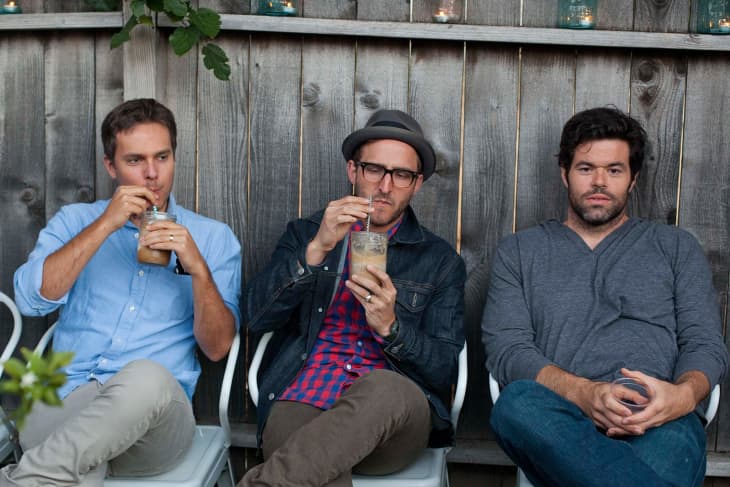5 Times to Say “No, Thank You” and 3 Things to Do When You Hear It
I don’t have allergies. Or maybe I do. Recently, I noticed a correlation between eating shrimp and getting a wild and itchy rash on my arms and neck. I haven’t been tested, but I think it’s best that I not eat shrimp. When offered a plate of shrimp appetizers, I am trying to say, “No, thank you,” because I don’t want to introduce the subject of itchy rashes at a perfectly lovely cocktail party. My “no, thank you” is usually well-received, as it should be. But occasionally it isn’t.
I think we all need to learn when to say it and when to hear it without comment. Let’s bring back “no, thank you” and follow it with a full stop.
There are a lot of things we don’t want to share. “I’m trying to lose a few pounds.” “Onions give me terrible breath, and I think I might make out with this nice lady I just met at your party.” (If you must say that one, please follow it with at least 10 seconds of dramatic eyebrow waggling, à la Groucho Marx.) And there are plenty of things we shouldn’t share. “Onions give me raging gas, you know, the kind that makes my dog go sleep in another room.” “Your asparagus quiche is one of the most vile things I’ve ever eaten, for real.”
5 Times to Say “No Thank You”
When is it okay to refuse something politely?
- You don’t like what’s offered.
- You’re allergic to it. Or it gives you raging gas.
- It isn’t on your current diet.
- The sky is blue and you don’t like to eat vile quiche when the sky is blue.
- Always.
It can be difficult to stop at “no, thank you,” but we really should. Instead of explaining yourself, just stop. If they offer again, say it again. If they persist with questions, you can say you would prefer not to talk about it (which pretty much means they’ll assume it gives you raging gas). Or take a page from media training: Don’t answer the question that was asked; answer the one you would have liked to answer. Celebrities do it, and they rarely get called out, because the interviewer wants to keep the camera rolling.
“Why don’t you want a cupcake? Are you on a diet or something? Or are you allergic?”
“No, thank you. Those look delicious! Do you bake often?”
Sure, it’s a non sequitur, but it’s also a fairly gracious way to avoid a rude question. Pro tip: This one works best with a vacant, non-committal smile.
In this world of over-sharing, it can be tough to stop at “no, thank you.” It feels awkward, but you will get used to it. You are not being rude by saying “no, thank you.” Anyone who refuses to accept it is being rude by questioning your motives.
But most of us are gracious hosts, and we want to make our guests happy. “No, thank you” fills us with concern, as we worry if our asparagus quiche is vile, or our guest has unmentioned allergies. There is a time and a place to ask those questions, especially of a good friend, but in the moment, in front of other guests, isn’t it.
I hope that if you are hosting a dinner party, you will have asked guests about their allergies, or they will have mentioned them in a matter-of-fact way. But maybe you have a friend who is so unfailingly polite and accommodating, that even though you have known him for 15 years, he has never mentioned an allergy. You pass a plate of shrimp puffs, and he says, “No, thanks.” Next time the two of you get together for coffee, go ahead and ask. But in the moment? Smile and move on to the next guest.
3 Things to Do When You Hear It
So, what are your options when you hear, “no, thank you?”
- Accept it and continue offering the dish to other guests, or eat it yourself.
- Remember that it’s not about you. Or maybe it is. But if your quiche is vile, at least your friend cares enough to be kind.
- Go ahead and ask, but be prepared for an awkward exchange, or a long, boring explanation. You brought it on yourself.
I try to stay away from carbohydrates at parties. Why, you ask? Because they make my ankles and hands swell, especially when combined with alcohol. And my ADD is easier to manage when I eat a lower-carb diet. Also, some carbs make me gassy, and — I won’t lie, because you asked — I’m trying to lose a few pounds. Don’t you wish I had just said “no, thank you?” And don’t you wish you hadn’t asked? The reason for refusing food should never be discussed unless both parties are really, really interested.
How do you feel about a simple “no, thank you?” Do you need more of an explanation when you hear it? Do you feel compelled to elaborate when you say it?
